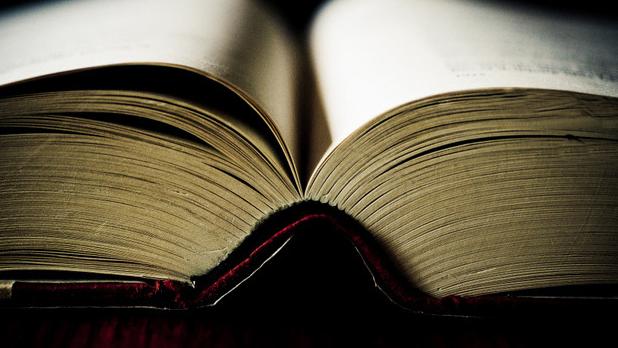Why is a poetry book flying off the shelves in Denmark?
It's not often that books of poetry fly off the shelves but that's exactly what's been happening in Denmark.
In October an 18-year-old unknown poet named Yahya Hassan published a self-titled book of poetry and Danes rushed out to buy it.
More than 100,000 copies sold. That's a lot of poetry books anywhere, but in Denmark that translates into roughly one in 50 people buying the book.
The poetry is raw and powerful look at Hassan's life as Palestinian immigrant growing up in Denmark.
"He lays it very bare and in the course of doing so he lays a lot of responsibilities for the problems of young men like himself at the feet of his parents’ generation and the Muslim immigrant community at large,” said Pedja Jurisic. Jurisic wrote about the poet Hassan for the Los Angeles Review of Books.
Hassan was born in Lebanon with Palestinian origins but grew up in Denmark under unhappy circumstances. His father was abusive; he dropped out of school and got involved in petty crimes.
“I think it’s a very unusual thing to hear him challenge his parents’ generation in such a direct way as he did both in the poetry and interviews he’s given to newspaper and television,” said Jurisic. “[He] draws an extensive critique against religious hypocrisy, intolerance against domestic abuse, misogyny, and fraud against the Danish welfare system all of which he details in his poetry.”
Another big theme that Hassad explores according to Jurisic, is the alienation that Hassan feels growing up as an immigrant in Denmark. Here's his poem "Outside the Door," where you can also see his signature all-caps style of poetry.
"Outside the Door"
I SAT IN THE WARDROBE WITH A CHRISTMAS DONUT IN HAND
AND LEARNED TO TIE MY SHOELACES IN SILENCE
DECORATED ORANGES WITH DIANTHUS SPICE AND RED BANDS
HANG FROM THE CEILING LIKE PERFORATED VOODOO DOLLS
THAT’S HOW I REMEMBER KINDERGARTEN
THE OTHERS WERE LOOKING FORWARD TO SANTA CLAUS
BUT I WAS JUST AS SCARED OF HIM
AS I WAS OF MY FATHER
“In a few lines he captures a Danish kindergarten at Christmastime, and also his alienation from these surroundings as an immigrant child and then also surprisingly points to the terror waiting for him at home,” said Jurisic.
Part of the appeal of Hassan’s poetry, according to Jurisic, is that he is giving native Danes a window into an immigrant community that can be pretty cut-off from Danish society at large. Still, Hassan’s frankness has also been criticized by some for painting an uneven and unfair view of immigrant community.
“I think some of his more controversial statements do give ammunition to the far right anti-immigrant party and I think that’s the concern of a lot of Danes who otherwise support him and see him as a very promising, young voice and important voice in this debate because he changes the national ideal of what Danish-ness is,” said Jurisic.
It's not often that books of poetry fly off the shelves but that's exactly what's been happening in Denmark.
In October an 18-year-old unknown poet named Yahya Hassan published a self-titled book of poetry and Danes rushed out to buy it.
More than 100,000 copies sold. That's a lot of poetry books anywhere, but in Denmark that translates into roughly one in 50 people buying the book.
The poetry is raw and powerful look at Hassan's life as Palestinian immigrant growing up in Denmark.
"He lays it very bare and in the course of doing so he lays a lot of responsibilities for the problems of young men like himself at the feet of his parents’ generation and the Muslim immigrant community at large,” said Pedja Jurisic. Jurisic wrote about the poet Hassan for the Los Angeles Review of Books.
Hassan was born in Lebanon with Palestinian origins but grew up in Denmark under unhappy circumstances. His father was abusive; he dropped out of school and got involved in petty crimes.
“I think it’s a very unusual thing to hear him challenge his parents’ generation in such a direct way as he did both in the poetry and interviews he’s given to newspaper and television,” said Jurisic. “[He] draws an extensive critique against religious hypocrisy, intolerance against domestic abuse, misogyny, and fraud against the Danish welfare system all of which he details in his poetry.”
Another big theme that Hassad explores according to Jurisic, is the alienation that Hassan feels growing up as an immigrant in Denmark. Here's his poem "Outside the Door," where you can also see his signature all-caps style of poetry.
"Outside the Door"
I SAT IN THE WARDROBE WITH A CHRISTMAS DONUT IN HAND
AND LEARNED TO TIE MY SHOELACES IN SILENCE
DECORATED ORANGES WITH DIANTHUS SPICE AND RED BANDS
HANG FROM THE CEILING LIKE PERFORATED VOODOO DOLLS
THAT’S HOW I REMEMBER KINDERGARTEN
THE OTHERS WERE LOOKING FORWARD TO SANTA CLAUS
BUT I WAS JUST AS SCARED OF HIM
AS I WAS OF MY FATHER
“In a few lines he captures a Danish kindergarten at Christmastime, and also his alienation from these surroundings as an immigrant child and then also surprisingly points to the terror waiting for him at home,” said Jurisic.
Part of the appeal of Hassan’s poetry, according to Jurisic, is that he is giving native Danes a window into an immigrant community that can be pretty cut-off from Danish society at large. Still, Hassan’s frankness has also been criticized by some for painting an uneven and unfair view of immigrant community.
“I think some of his more controversial statements do give ammunition to the far right anti-immigrant party and I think that’s the concern of a lot of Danes who otherwise support him and see him as a very promising, young voice and important voice in this debate because he changes the national ideal of what Danish-ness is,” said Jurisic.
